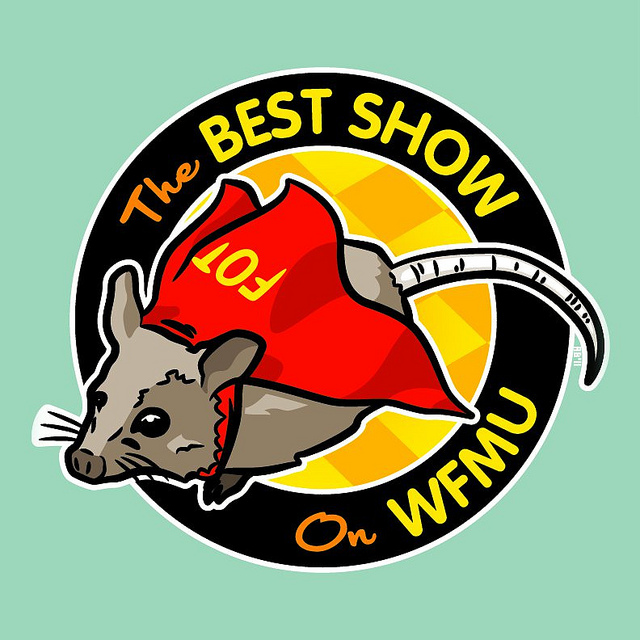The Best Show on WFMU: 2000-2013
 To my mind, Tom Scharpling belongs in the canon of great American broadcasters. In an era when, for better and worse, cheaply produced podcasts reign supreme, Scharpling continues to fly the flag for old-school, over-the-airwaves community broadcasting (even if most of the show’s latter-day listeners probably listen via internet stream or podcast). His Best Show on WFMU has been a going concern for thirteen years–since the Clinton administration, as Scharpling is fond of pointing out. On December 17, when Tuesday turns into Wednesday, that run ends. I’ve written about The Best Show here before, so in this post I want to celebrate the program as it ends. But rather than churning out a weepy eulogy, I simply offer a few scattered (and I do mean scattered) bullet points—some personal, some academic(ish), all in some way or another expressing what the program has meant to me over the years.
To my mind, Tom Scharpling belongs in the canon of great American broadcasters. In an era when, for better and worse, cheaply produced podcasts reign supreme, Scharpling continues to fly the flag for old-school, over-the-airwaves community broadcasting (even if most of the show’s latter-day listeners probably listen via internet stream or podcast). His Best Show on WFMU has been a going concern for thirteen years–since the Clinton administration, as Scharpling is fond of pointing out. On December 17, when Tuesday turns into Wednesday, that run ends. I’ve written about The Best Show here before, so in this post I want to celebrate the program as it ends. But rather than churning out a weepy eulogy, I simply offer a few scattered (and I do mean scattered) bullet points—some personal, some academic(ish), all in some way or another expressing what the program has meant to me over the years.
Mirth
– The centerpiece of any given episode of The Best Show tends to be the phone call between Scharpling and comedy partner Jon Wurster (the drummer for Superchunk, The Mountain Goats, and Bob Mould) in character as one of any number of weirdos that populate fictional Newbridge, NJ. When it comes to world-building, the “Whedonverse,” such as it is, has nothing on Newbridge. If the construction of ambitiously fleshed-out narrative worlds has generally been considered within the realms of science fiction or fantasy, the collected works of Scharpling and Wurster remind us that world-building can pay dividends in comedy. Spending thirteen years building out a story-world deepens jokes, sustains long-simmering storylines, and offers opportunities to subvert well-built expectations.
Music
– More than pretty much anything else, The Best Show finally pushed me past my punk-influenced disavowal of many of the classic rock groups I grew up listening to. On a free-form radio station where you’re likely to hear James Chance instead of James Taylor, or Yoko Ono instead of The Beatles, what could be more subversive than playing a different Led Zeppelin song every week?
– As a matter of fact, The Best Show’s use of music has given me cause to think about the personal, individual nature of taste. While academics who study taste tend to follow Bourdieu’s lead and think of it as a social phenomenon informed by our stations in life, there can be dissonance between understanding that on an intellectual level and at the same time emotionally and affectively feeling like something was made just for you—as if it sprung from the cabinet of your brain that stores your feelings about the things you like. “Evan likes ‘60s garage rock, Julie Klausner, Ted Leo, Superchunk, free-flowing conversations about popular culture, Kurt Vile, Patton Oswalt, Aimee Mann, etc etc etc, so here—have this thing that pulls together all of that stuff.” Now, obviously, I know that habitus has much to do with why I like these things. Still, while the tensions between taste as individual experience and social/structural formation have been fundamental to much of the canonical writing on the subject, it can be a strange thing to experience them oneself.
Mayhem
– Focusing only on the Scharpling and Wurster bits threatens to elide that any given episode of The Best Show features at least two additional hours of comedy, conversations, and miscellany. These ingredients make the program fundamentally unpredictable—a capriciousness amplified by the live nature of the program. Now, I’m a sucker for liveness. It’s why I love watching sports, awards shows, and Saturday Night Live regardless of quality, and it’s why I watched NBC’s live Sound of Music last week in spite of that fact that I’m an avowed SoM hater. So, I do listen live whenever possible—and in an era where more and more of my media experiences are delayed, on-demand, or catch-up, I’ll miss the presence of one more live experience in my weekly media diet.
– Most of all, though, I lament the end of The Best Show because it’s truly singular: free-form conversations with callers and guests, occasional musical performances, puppets, sound collages, and other bits of randomness. It is to the call-in radio show what Late Night with David Letterman was to the late-night talk show: proof that well-established formats are still ripe for experimentation and can be opened up and toyed with. If we’re lucky, The Best Show will be just as influential on future generations of comedians.


